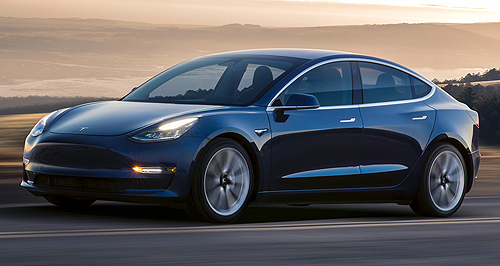Make / Model Search
News - General NewsChina set to throw open motor marketMade in China: Tesla might be the first beneficiary of China’s more relaxed car manufacturing rules that will allow western manufacturers to build factories in China without a Chinese partner. Seismic shift as China slashes restrictions on foreign car-makers18 Apr 2018 FOREIGN car-makers will no longer be forced to partner with a Chinese manufacturer to make and sell duty-free vehicles within China under new rules to be phased in over the next four years. Electric and alternative energy vehicle manufacturers such as Tesla will be allowed to set up factories in their own right in China as early as this year, while similar arrangements for commercial vehicles and passenger cars will apply from 2020 and 2022 respectively. The announcement by China’s National Development and Reform Commission in Beijing took the global motor industry by surprise, coming hard on the heels of an unexpected promise last week by Chinese president Xi Jinping to “considerably reduce” the 25 per cent tariff on vehicle imports in China. The move threatens to dramatically change the dynamics of the world motor industry, throwing the world’s biggest motor market open to greater competition and at the same time giving western car-makers greater control over their own affairs there. Until now, car manufacturers who wanted to establish factories in China without incurring a prohibitive tariff had to find a joint-venture partner under limits to shareholdings. For example, the two biggest western motor manufacturers within China, General Motors and Volkswagen, are both partnered with Shanghai’s SAIC Motor in 50-50 ownership joint ventures. FAW, Changan, BAIC and Dongfeng are also among the Chinese partners for manufacturers such as Toyota, Ford, Mazda, Mercedes-Benz, Hyundai and Nissan. These Chinese companies are state controlled, effectively owned by provincial governments. The foreign companies have been restricted to two joint ventures in China – another rule that is set for the chop under the new regulations announced this week. Tesla founder Elon Musk has been arguing against the ownership rules, saying he wants to establish a Megafactory in China to build cars and batteries for that market, but only if his own company has complete control, not just of the manufacturing process but also of Tesla’s intellectual property. Under the current regulations, the planned Tesla factory could go ahead in the Shanghai economic zone, but its products would incur the same 25 per cent tariff as imports. Now, every Tesla made in China will be 25 per cent cheaper ex-factory, putting the brand on a much more competitive footing against rival EVs within China. Over the past two decades, Chinese vehicle manufacturers have benefitted greatly from the transfer of skills and technologies from foreign car-makers, allowing them to build increasingly competitive vehicles under their own brands such as MG and LDV. The Chinese industry is now at the stage of ramping up its export sales in western markets, but countries such as the US had been shaping up to push back against Chinese vehicles while China still restricted its market. GM already exports Buick Envision SUVs to North America, while Ford is about to start shipping Chinese-made Focus small cars to North America. Volvo – wholly owned by Chinese private company Geely – also exports XC90 luxury SUVs made in China to western markets. China is styling itself as the world leader in electric vehicles (EVs), simultaneously encouraging and forcing manufacturers in China to make the shift to EVs by introducing manufacturing quotas and increasingly stringent restrictions on petrol and diesel vehicle registrations in large cities. Beijing’s changing rules would suggest that it is confident that these measures are putting China in a position to make a major push into markets that until now have given the cold shoulder to Chinese cars. Existing joint ventures are unlikely to be unwound quickly, as the lead times on new models and fresh factories is years. However, western car-makers might be tempted to start planning new factories for all-new models in years to come. For many manufacturers including GM and Volkswagen, China is their biggest market, in some cases effectively propping up the rest of their global operations.  |
Click to shareGeneral News articlesResearch General News Motor industry news |












Facebook Twitter Instagram